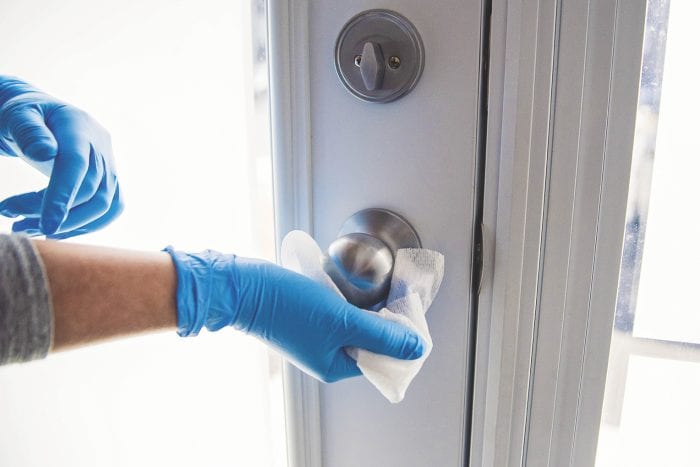By Susan V. Donelan, MD, FSHEA

During the coronavirus pandemic, everyone has been trying to ready themselves and their households for a possible long stay at home. Stories abound about toilet paper and hand sanitizer shortages, not to mention water, milk and bread. Even ice cream is in short supply.
To be well prepared, experts recommend having a two-week supply of food on hand, including pet food, plus a 90-day supply of prescription medications and a thermometer. Another part of prudent planning is to prepare for the possibility that a member of your household will become infected.
Your goal should be to prevent one family member’s exposure from becoming multiple exposures that spread the virus throughout your entire family. Here are some safe practices to take:
• The exposed person should wear a surgical mask, if available, to prevent airborne respiratory droplets from infecting others. If a surgical grade mask is not available, a homemade one should be used.
• Regardless of whether the exposed person is wearing a mask, other family members should stay at least six feet away from the exposed person. Those who must come in closer contact should also wear surgical masks when caring for their loved one.
• If possible, the exposed person should sleep alone in a separate bedroom and use a separate bathroom from the other members of the household.
• Common areas such as dens and kitchens should not be shared as long as the exposed person is infectious, if possible. Common surfaces should be regularly sanitized; commercial products are sufficient. Shared spaces should be well ventilated (e.g., keep windows open), when possible.
• Meals should be eaten in separate locations. If possible, create separate cooking and food storage locations for the infected family member. Use separate linen and eating utensils for your loved one. Dishes and utensils should be placed into the dishwasher and are safe to handle once the washing and drying cycles are completed. If a dishwasher is not available, wash dishes and utensils in hot, soapy water while wearing dishwashing gloves.

• Caring for someone with mild to moderate symptoms of coronavirus is similar to caring for someone with the flu. Give them supportive care, fluids, soups and over-the-counter cough medicines and pain relievers to ease symptoms. Have them take their temperature regularly.
• If someone at home with coronavirus begins to have chest pain, is unable to complete sentences due to breathlessness, has dusky skin, is unable to eat and drink, or has other concerning signs of getting worse, they should be brought to the local emergency department for further evaluation.
• Perform hand hygiene after any type of contact with your loved one. The exposed person should clean and disinfect surfaces daily that are frequently touched in the room where he or she is staying. They should also clean and disinfect their bathroom and toilet surface at least daily.
• Clean the person’s clothes, bed linens and bath and hand towels using regular laundry soap and water at the hottest permissible setting. Use a dryer if available. Use gloves when cleaning surfaces or handling clothes or linen soiled with body fluids.
• Healthy members of the household should frequently clean household surfaces, especially high-touch surfaces such as handles, doorknobs, appliances, etc.
Establish a communication link with your healthcare provider ahead of time, know where your closest hospital is, and have a checklist of emergency supplies if you need to take your loved one to the hospital. If they are so sick or weak that they can’t eat, drink or go to the bathroom, call a doctor.
Detailed guidance about caring for people at home is available from the World Health Organization website: www.who.int/publications-detail/home-care-for-patients-with-suspected-novel-coronavirus-(ncov)-infection-presenting-with-mild-symptoms-and-management-of-contacts
The best advice? Take care of yourself and your loved ones. Get rest, eat well and exercise however you can. Maintain social distancing. Pay close attention to hand hygiene, and keep your hands off of your face. We all have a role to play to stop the spread and protect each other during this global pandemic.
Susan V. Donelan, MD, FSHEA is Medical Director of the Healthcare Epidemiology Department and Assistant Professor, Infectious Diseases at Stony Brook Medicine.





